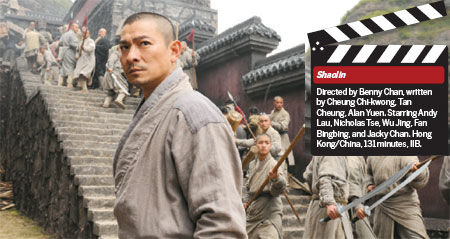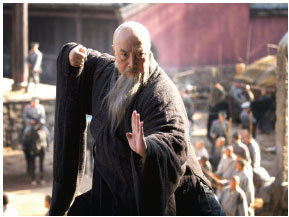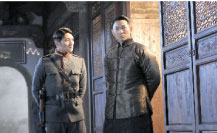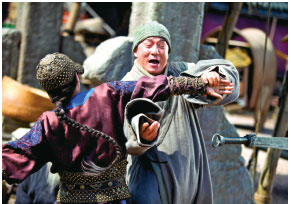Can I get an 'Amen'?
Shaolin is a busy mix of faith and fists of fury.
 |
|
Hou, now Chingchueh, prepares to defend the temple and the men that changed his life in the theologically charged Shaolin. [China Daily] |
If you really want to watch film critics get squirrelly in their seats, try and get into a press screening of anything that smacks remotely of God. Not fantastical science fiction that posits alternate realities or civilizations with alien religious codes - something like Battlestar Galactica and its Gods of Kobol - but good ol' God, in any form. Also exempt from the squirm inducement are films where the church is a plot device (like the upcoming Anthony Hopkins exorcism thriller The Rite) and films about questioning one's faith in the face of some sort of trauma (anything by Lars von Trier).
|
|
|
Wudao the cook (Jacky Chan) finds his inner martial artist when the Shaolin Temple is threatened in Benny Chan's Shaolin. [China Daily] |
When Mel "I hate everyone" Gibson's Passion of the Christ a) was marketed heavily to the Christian demographic and b) earned upwards of $1 billion at the box office, the devout came out of the shadows. Film producers that were staunchly religious started making films that flaunted that and more and more production companies sprang up that had a mandate to make "entertainments of faith," chief among them Walden Media, producers of The Chronicles of Narnia. There's also Fox Faith, because hey, everyone's money is the same color. Whether or not such films should exist isn't the issue - Christian rock has existed for decades. The issue, or the curiosity factor, is why mainstream filmmakers have such a hard time making a decent film with a non-critical religious angle. The Narnia films haven't been exactly groundbreaking cinema, and Passion had a raft of artistic hiccups.
 |
|
The Shaolin Temple Abbot (Yue Hoi) is finally pushed to action in another telling of the Shaolin Temple story in Shaolin. [China Daily] |
Also curious is why Christianity seems to be at the heart of the debate. It may be a simple case of lack of content from the Hindu, Muslim, or Jewish point of view, granted that may have to do with what X country sees from Y and vice versa. If a god-fearing film can pull in hundreds of millions of dollars, perhaps a Buddha-fearing film can too. Well ... we're about to find out. Because regardless of personal beliefs, it's hard to take Benny Chan's action-packed Shaolin as anything other than a glowing religious tract. If Passion was Jesus porn, this is the Buddha iteration.
 |
|
Tsao and Hou (Nicholas Tse and Andy Lau) plot against a rival warlord while they're still on the same side in Benny Chan's Shaolin. [China Daily] |
In what is basically a retread of Jet Li's Shaolin Temple, General Hou (Andy Lau) is a warlord on a conquering tear. It's the late Qing Dynasty and infighting is ripping the country to shreds. After taking the town of Tengfeng, Hou and his trusty aide-de-camp Tsao Man (Nicholas Tse) plot to eliminate a rival warlord whom Hou thinks is plotting a takeover himself. Before you can say "Praise be to Buddha," Tsao has double-crossed them both, putting Hou, his wife (Fan Bingbing) and young daughter in a fight for their lives. Irony of ironies sees Hou seeking haven at the Shaolin Temple, where his bloody conquest began. What comes next - next being another 90 minutes - is the stuff of redemptive action movies the world over.
There's an odd mix of themes in Shaolin, neither of which is at all subtle and the result is a screed that's about as graceful as a sledgehammer to the skull. On one side is Hou's fall from grace and rediscovery of his humanity once he finds the path to God, or, er, Buddha. The final image of Hou would be howlingly hilarious if it weren't so dead serious. The monks at the temple are some of the purest, most selfless characters to grace the screen any time in recent memory, and following Buddhist tenets winds up feeling like a ticket to martyrdom more than a belief system. Need more? In that case how about Jacky Chan's temple cook Wudao leading the oppressed masses on a Moses-like exodus to safety? No. Really. He's only missing the staff.
On the other side is the foreigner panic that forms the basis for Tsao's evilness. Hou, though a murderous warlord at one point, took pains to see the big picture, and warned that allowing a railway to be built in Tengfeng would be "opening our doors to foreigners". It's a clumsy parallel with modern China, but then again, director Benny Chan (Divergence, Invisible Target) has never been singled out for his light touch. In some ways Shaolin recalls last year's Bodyguards and Assassins with its sly warnings about civil disobedience, but Teddy Chan's film was infinitely more elegant in its messaging.
Ideology aside, Shaolin is a flawed film that has about 46 too many endings without which Chan may have been able to pull in a nice, tight 100-minute actioner. Instead, we're treated to long stretches of cliche epiphanies and mustache-twirling bad guys. Fight choreography and action direction from the trio of Cory Yuen (Red Cliff, X-Men), Yuen Tak (Sniper) and Li Chung-chi (Gen-X Cops) guarantees nearly flawless action sequences and creative fights - and also that non-martial artists Lau and Tse don't make fools of themselves. However, it can't draw attention away from a hackneyed script that's rife with some of the all time greats vis-a-vis action cinema. How do we know Tsao has become mad with power? He's got a new, sneaky looking bit of facial hair and he's not wearing a tie. Why does Tsao, so fond of the Gatling gun and various other pistols, not just shoot Hou when they meet for their final confrontation? How can so many soldiers miss so many targets? And is it really so hard to find an English-speaking actor around here that doesn't sound like he's from a 1950s James Cagney movie?
But some of those clichs do work, particularly when Chan and Co transplant modern action templates onto Qing technology. There is a white-knuckle "car chase" that could have been lifted from The French Connection except for the horses and carriages, and some amazing battlefield set pieces that are suitably grim. Shaolin is also intensely Asian and speaks, however unsubtlely, to local culture and 2011 as it does to ancient China. Coming out just ahead of the lunar new year indicates the film's distributors are expecting big business, and they may get it.
 0
0 







